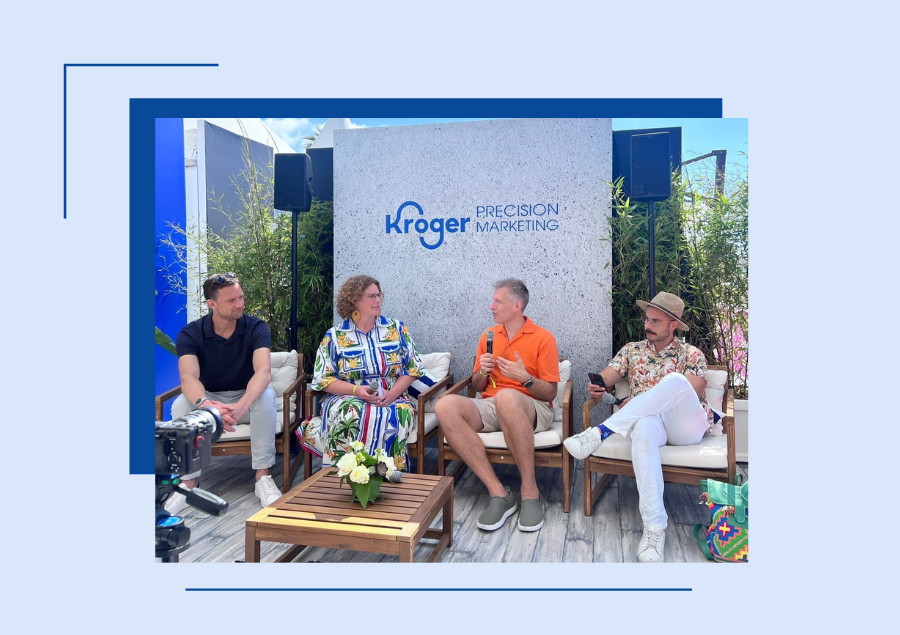
Cheap Impressions Aren’t Cheap
How Brands and Agencies Are Paving a New Way Forward for Sustainability in Programmatic Advertising
The debate around cheap CPMs (cost per thousand impressions) took center stage at the 2024 Cannes Lions International Festival of Creativity. In a panel discussion presented by Kroger and GroupM, industry leaders delved into the financial and environmental costs of low-quality advertising impressions.
Moderated by Jeffrey Bustos, VP of Measurement and Addressability & Data at IAB, the panel featured Brian O'Kelley, Co-founder and CEO of Scope3, Rich Astley, Chief Product Officer at Choreograph, and Cara Pratt, SVP of Kroger Precision Marketing (KPM).
The session emphasized the need for sustainable advertising practices and demonstrated that what’s good for the planet can also be good for business.
The waste problem in programmatic advertising
Brian O'Kelley kicked off the discussion by highlighting recent research from Stanford and Carnegie Mellon universities, revealing that a significant portion of programmatic advertising investments result in wasted impressions.
"The vast majority of advertisers are buying waste—ads that they don’t want to buy," O'Kelley stated. He compared this to the broader issue of climate change, where individuals often see the problem as someone else’s responsibility. This perspective fueled the creation of Scope3, aiming to optimize the advertising supply chain to reduce financial and environmental waste.
The role of quality CPM
Rich Astley addressed the ongoing tension between procurement-driven cost efficiency and the increasing awareness of carbon emissions in the media supply chain. He introduced the concept of Quality CPM (QCPM), which incorporates metrics such as viewability, attention, and carbon impact.
"It’s not just the price you bought it for, it’s the impact of that impression throughout the whole supply chain," Astley explained. This approach requires strategic conversations and common industry standards to ensure consistent measurement and reporting.
Using retail sales data to drive precision
Cara Pratt highlighted how Kroger Precision Marketing applies retail data to enhance programmatic advertising. By focusing on precise audiences using retail purchase data, KPM has achieved significant reductions in carbon emissions.
"When we first started our journey, our carbon emission was 17% lower for the campaigns we deployed. This last wave, we measured 37% fewer emissions per impression," Pratt shared. This demonstrates the dual benefit of precision audiences in programmatic media: better business outcomes and reduced environmental impact.
Education and industry standards
The panelists agreed on the critical role of education and industry standards in promoting sustainable advertising practices. Brian O'Kelley emphasized the importance of a unified approach, mentioning the upcoming industry framework from the Global Alliance for Responsible Media and Ad Net Zero.
"If we all agree on what 'greener' means, then that’s a really powerful value proposition," he said. The establishment of common standards will facilitate more widespread adoption and consistent reporting, making sustainability an integral part of advertising strategies.
Looking ahead
Panelists envisioned a future where sustainability in advertising becomes a standard practice. O'Kelley expressed hope that in five years, sustainability would be a given, and the industry could focus on new challenges.
He also highlighted the potential impact of AI on energy consumption and the pressing need to address climate change proactively. Cara Pratt echoed these sentiments, emphasizing the need for continuous optimization and automation in achieving sustainability goals.
Building a sustainable future for digital advertising
Leaders underscored the urgent need to rethink advertising practices from both financial and environmental perspectives. By embracing Quality CPM, leveraging precise retail data, and adhering to industry standards, agencies and brands can create more sustainable and effective advertising campaigns. As the industry moves towards greener practices, the collective effort will not only enhance business outcomes but also contribute to mitigating climate impact.
Visit our knowledge hub
See what you can learn from our latest posts.




